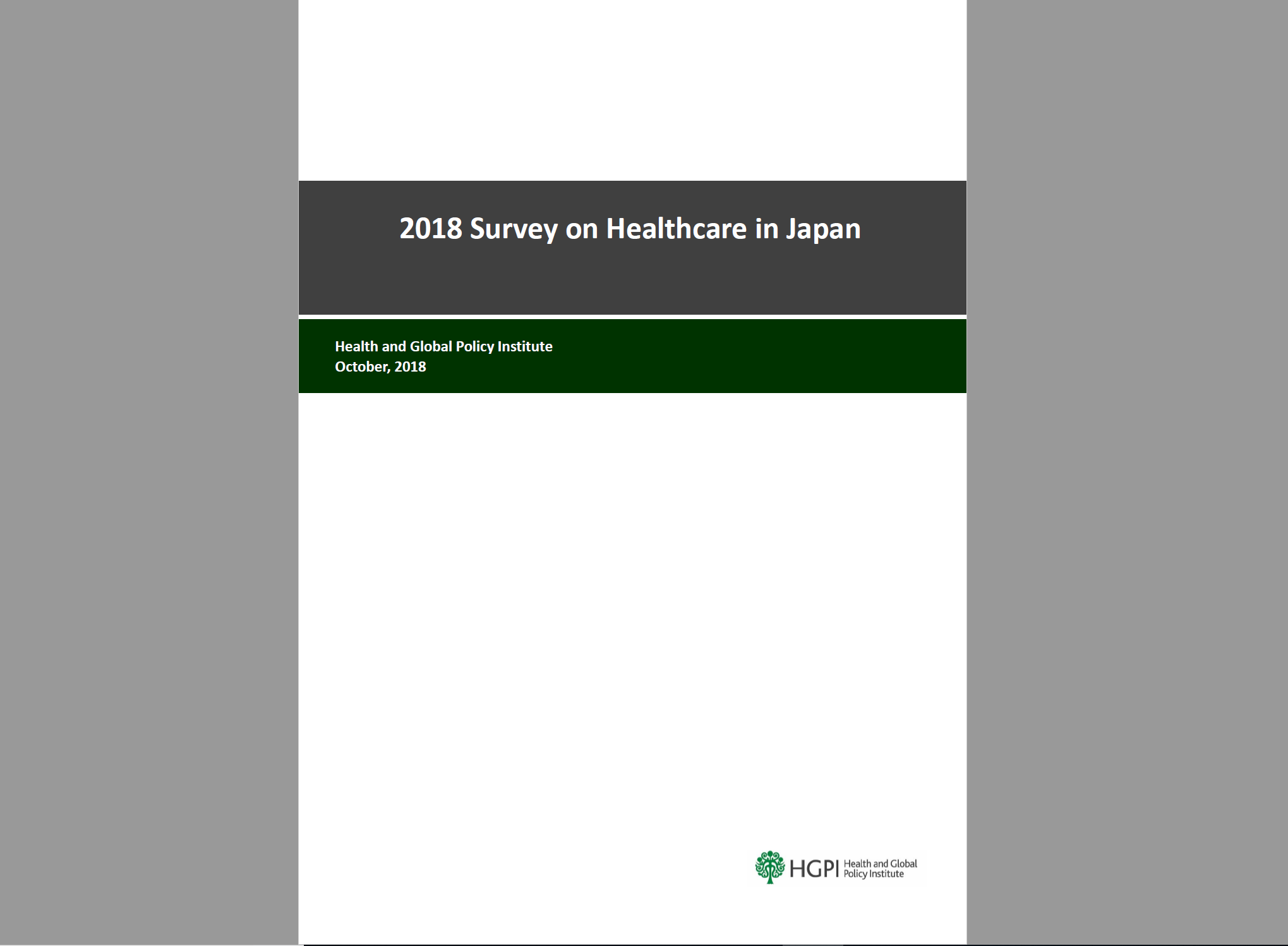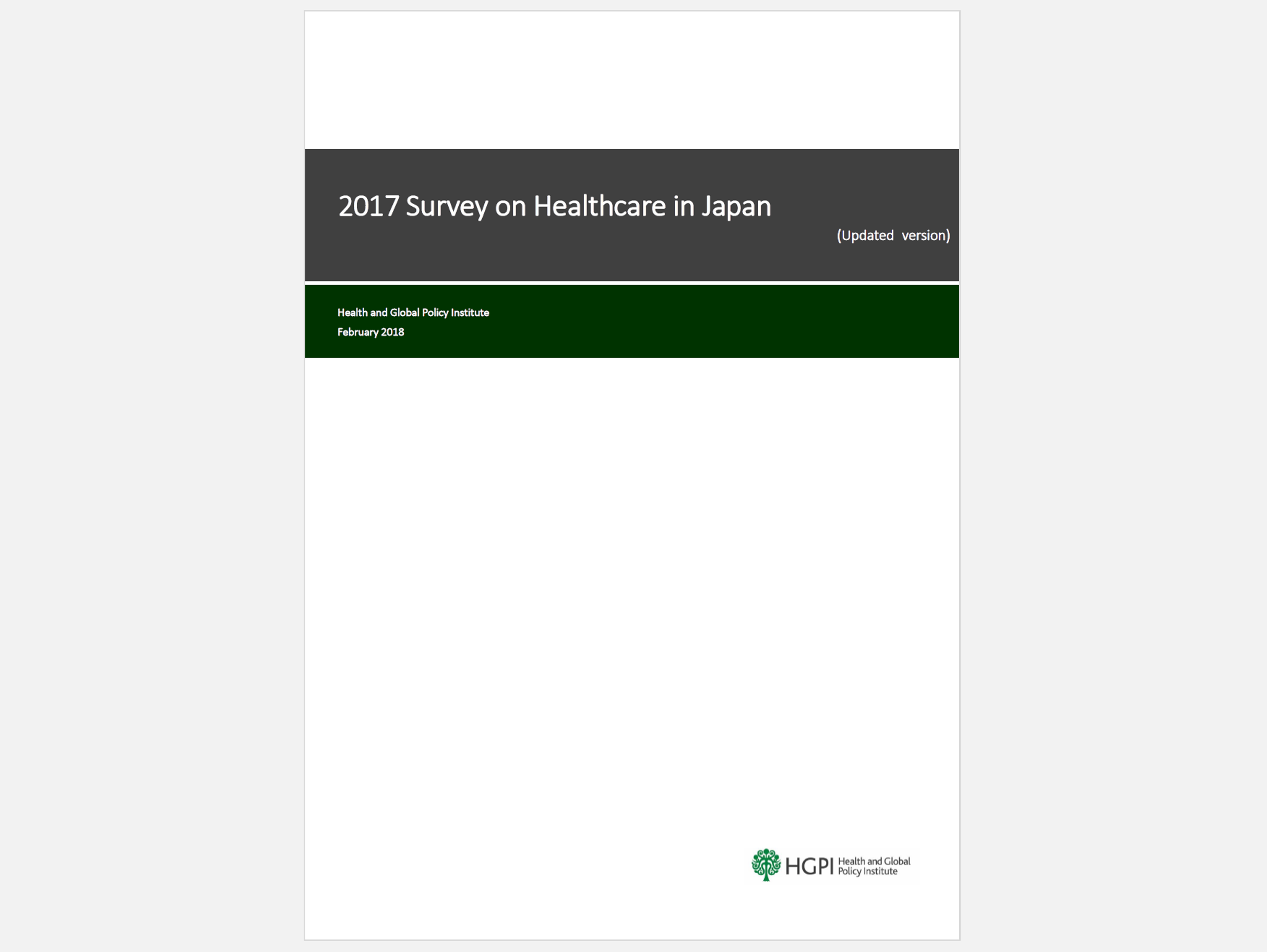[Research Report] 2019 Survey on Healthcare in Japan
date : 12/16/2019
Tags: AMR, Future of the Health Care System, Innovation and Sustainability, Survey on Healthcare in Japan
![[Research Report] 2019 Survey on Healthcare in Japan](https://hgpi.org/en/wp-content/uploads/sites/2/survey2019-top_eng.jpg)
The English version of the report has been published on December 16, 2019
For more information, please refer to the PDF.
HGPI has conducted regular surveys of public opinion on healthcare issues since 2006 to gain a better understanding of public perceptions and a better awareness of the health services and health care policies that the public desires. Continuing on from previous surveys, the 2019 survey included questions on the level of satisfaction that the public feels with the current healthcare system. The survey also inquired about public participation in healthcare policy and sustainability of the National Health Insurance system. In addition, it inquired about issues that have been garnering attention recently, namely high-cost drugs, antimicrobial resistance, and vaccines.
Survey Highlights
Satisfaction levels towards healthcare and healthcare systems
- 62% of respondents were satisfied with healthcare and healthcare systems in Japan. The highest satisfaction was reported for “safety of care.”
Public participation in healthcare policy
- About 80% of respondents want their opinions reflected in the healthcare policy creation process.
Sustainability of the National Health Insurance system and high-cost drugs
- About 80% of respondents supported providing health insurance coverage for high-cost drugs.
Antimicrobial resistance
- Over half of respondents did not know that antimicrobials and antibiotics are ineffective for treating the common cold or influenza.
Vaccines
- About 70% of respondents did not know that the HPV vaccine is effective at preventing HPV infection and the conditions that lead to cervical cancer.
■ Future discussion points in healthcare policy suggested by survey results
- Public satisfaction towards medical safety and the quality of technology was high, so it is safe to say that the public recognizes the value of the work done by healthcare providers in clinics and hospitals. On the other hand, opportunities for the public to be involved in promoting countermeasures for each disease have been limited. This has resulted in in low satisfaction levels towards both the transparency of the healthcare system policy creation process as well as measures to reflect public opinion in that process. Approximately 80% of respondents stated that they want their opinions reflected in healthcare policy. Examination committees for policy formulation and other such groups should include public interest members and members of committees representing people receiving healthcare. In addition, it may be necessary to hold discussions on and rebuild mechanisms and systems for reflecting public opinion in healthcare policy in the future.
- Respondents showed clear support for providing public medical insurance coverage for high-cost drugs. This raises the question of how to develop recognition that some items will not be covered due to limited financial resources. Given the fact that drug spending accounts for less than 20% of total healthcare costs, the question of how to improve the overall efficiency of the healthcare system in a way that the public will support must be clarified through future surveys.
- In the field of vaccines and antimicrobial resistance (AMR), it was clear that information based on scientific evidence has yet to penetrate among the public. To ensure the health of every member of society regardless of their literacy on the topic of vaccines and AMR, it will remain important to examine methods of disseminating evidence-based information and developing evidence-based policies.
Top Research & Recommendations Posts
- [Policy Recommendations] The Path to a Sustainable Healthcare System: Three Key Objectives for Public Deliberation (January 22, 2026)
- [Research Report] Perceptions, Knowledge, Actions and Perspectives of Healthcare Organizations in Japan in Relation to Climate Change and Health: A Cross-Sectional Study (November 13, 2025)
- [Research Report] The 2025 Public Opinion Survey on Healthcare in Japan (March 17, 2025)
- [Policy Recommendations] Reshaping Japan’s Immunization Policy for Life Course Coverage and Vaccine Equity: Challenges and Prospects for an Era of Prevention and Health Promotion (April 25, 2025)
- [Research Report] The 2023 Public Opinion Survey on Satisfaction in Healthcare in Japan and Healthcare Applications of Generative AI (January 11, 2024)
- [Research Report] AMR Policy Update #4: Cancer Care and AMR (Part 1)
- [Policy Recommendations] Developing a National Health and Climate Strategy for Japan (June 26, 2024)
- [Public Comment Submission] “Assessment Report on Climate Change Impacts in Japan (Draft Overview)” (December 24, 2025)
- [Research Report] Survey of Japanese Physicians Regarding Climate Change and Health (December 3, 2023)
- [Research Report] The Public Opinion Survey on Child-Rearing in Modern Japan (Final Report) (March 4, 2022)
Featured Posts
-
2026-01-09
[Registration Open] (Hybrid Format) Dementia Project FY2025 Initiative Concluding Symposium “The Future of Dementia Policy Surrounding Families and Others Who Care for People with Dementia” (March 9, 2026)
![[Registration Open] (Hybrid Format) Dementia Project FY2025 Initiative Concluding Symposium “The Future of Dementia Policy Surrounding Families and Others Who Care for People with Dementia” (March 9, 2026)](https://hgpi.org/en/wp-content/uploads/sites/2/dementia-20260309-top.png)
-
2026-02-05
[Registration Open] (Webinar) The 141st HGPI Seminar “Current Status and Future Prospects of Korea’s Obesity Policy: Voices of People with Lived Experience in Policy Promotion” (March 3, 2026)
![[Registration Open] (Webinar) The 141st HGPI Seminar “Current Status and Future Prospects of Korea’s Obesity Policy: Voices of People with Lived Experience in Policy Promotion” (March 3, 2026)](https://hgpi.org/en/wp-content/uploads/sites/2/hs141-top-1.png)
-
2026-02-06
[Research Report] AMR Policy Update #5: Cancer Care and AMR (Part 2)
![[Research Report] AMR Policy Update #5: Cancer Care and AMR (Part 2)](https://hgpi.org/en/wp-content/uploads/sites/2/HGPI_20260204_AMR-Policy-Update-5.png)






